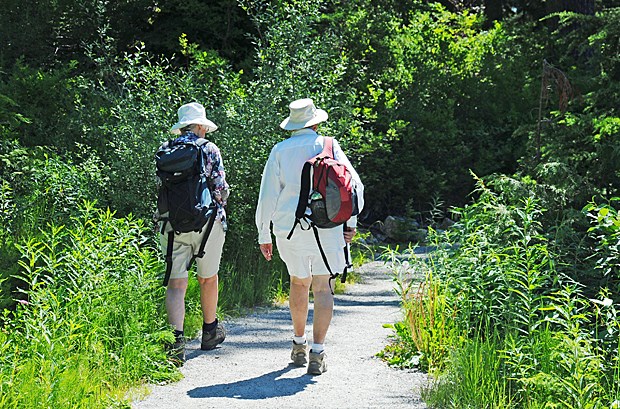While the province is beginning to reopen, physical distancing is still recommended especially for seniors and at-risk people with compromised health or immune systems.
If you are like me and many other seniors, you may have some trepidation about adopting to the “new normal.”
As Dr. Michael Hochman states in the June newsletter of On Health: “We know immune systems change with age making it harder to fight off diseases and infections even if you’re otherwise healthy.”
He goes on to state that “older adults are also more likely to have health conditions such as high blood pressure and type-2 diabetes, that seem to worsen outcomes from COVID-19.”
But as some of us have experienced, coping while physical distancing is a continuing challenge. Suggested strategies for coping mentally, cognitively, and physically include eating right, maintaining strength, and staying socially connected.
Maintaining strength involves a good exercise plan and walking is one of the best ways to maximize your exercise regime. Our public health officer in British Columbia has noted how walking outdoors is important to citizens as they cope with self isolation and physical distancing. Of course, she advises us that we need to stay at least six feet apart from others who are not in our household bubble.
At this time of year and during the COVID-19 pandemic, getting out for a walk can have incredible benefits. As well as the health benefits such as improving vascular heath, fighting diseases, strengthening bones, muscles, and joints, and promoting heathy weight, exercise can give us a mood boost.
According to McMaster Optimal Age Portal, “one study from California State University Long Beach found that there was a direct connection between mood and walking. In short, the more steps a person took per day, the more positive their attitude and outlook. One major reason behind the connection could be that walking helps naturally release endorphins and promotes circular breathing, leading to emotional benefits.”
We are lucky in North Vancouver to have some great walks such as the Spirit Trail, the West Vancouver Seawall, the Kings Mill Walk and the Maplewood Conservation Area. But walks in your neighbourhood are just as good and as I have experienced in some cases, they are somewhat safer as they do not always include the forgetful (or possibly uncaring) walkers who do not distance the required six feet. On a walk along a quiet street, I can get out of the way of these careless pedestrians more easily.
It has been suggested that along with walking, one could try some strengthening exercises for 30 minutes at least twice a week and a balance exercise such as standing on one leg and then the other daily. Walking, strengthening and balance exercise also have the bonus of helping to prevent falls and hip fractures.
If walking is not enough for or even too strenuous, try some online activities. For instance, Parkgate Community Services Society has created a video of a Keep Well instructor demonstrating some favourite exercises so you can stay active at home.
And Silver Harbour’s Tai Chi instructor suggested the following YouTube video for anyone who wants to continue to practise Tai Chi from home.
In the June special edition of the West Vancouver Scene magazine, the Health and Fitness Team state, “Although there may be some temporary limitations on the types of activities we can do, and where we can do them – there are plenty of creative ways left to stay active, well and happy during this challenging time.”
They suggest several times a day you could take a five- to 10-minute break to move around your home. Perhaps you could do some light or heavy gardening and often tidying and cleaning your house, car, or garage. Their advice is to find exercises that work for your level of comfort and repeat daily – some excellent exercises can be found in the magazine.
Or you can simply look for suitable exercise classes on TV. Check your cable TV for a fitness channel.
It is clear from our health authorities that the greatest risk of COVID-19 infection is exposure – and physical distancing is the most effective tool we have for prevention.
One of the best strategies for coping as we physical distance is exercise. It will not prevent us from getting the virus if, unfortunately, we are exposed to it. But physical activity prevents us from becoming sedentary which contributes to our overall health and well being.
Margaret Coates is the co-ordinator of Lionsview Seniors’ Planning Society. She has lived on the North Shore for 50 years and has worked for and with seniors for 25 of those years. Ideas for future columns are welcome Email: lions_view@telus.net.



